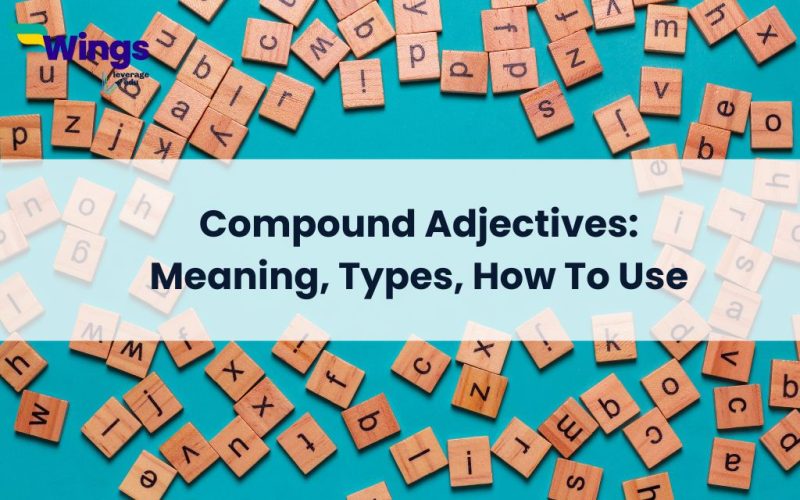Words that combine two or more words to form an adjective are known as compound adjectives. They are an effective tool for speakers and writers who wish to use language that is more precise, brief, and evocative. In this blog below we will give you all the details regarding compound adjectives. Continue reading below.
This Blog Includes:
What are Compound Adjectives
When two or more adjectives are combined to modify a single noun, a compound adjective is created. It is best to hyphenate these nouns to prevent ambiguity or misinterpretation.
Exceptions
It should be noted that an adjective and an adverb do not combine to form a compound adjective. Since it is obviously evident that the adverb affects the adjective rather than the following noun, there is no need for a hyphen.
Also Read: Want to improve your English? You should definitely read these Best English Grammar Books.
Types of Compound Adjectives
Two singular adjectives are not always present in a compound adjective. We understand it may sound a little unclear, therefore the following chart should provide further clarification:
| Parts of Speech | Examples |
| Noun+Part Participle | Whitewashed, homegrown, sun-dried |
| Adjective+Noun | Short-term, long-distance, first-time |
| Number+Noun | Second-place, four-wheel, nineteenth-century |
| Noun+Noun | Bulletproof, seasick, meat eater |
| Adjective+Present Participle | Spanish-speaking, Fast-talking, backwards-facing |
| Adjective+Past Participle | Deep-fried, double-baked, warm-blooded |
| Noun+Present Participle | French-speaking, self-effacing, mouth-watering |
| Noun+Adjective | Ice-cold, cruelty-free, sky-blue |
| Adverb+Past Paarticiple | Tightly wound, undercooked, overpopulated |
Also Read: History of English Literature
Lists of Compound Adjectives
Hyphens are typically used to identify compound adjectives. A small selection of compound adjective examples can be found in the list below:
👉Blue-eyed
👉Brand-new
👉Dark-haired
👉Deep-sea
👉Easy-going
👉Good-looking
👉Hard-working
👉High-quality
👉Ill-mannered
👉Long-lasting
👉Middle-aged
👉Never-ending
👉Old-fashioned
👉Part-time
👉Well-known
👉Well-written
👉Yellow-striped
Where Do You Include a Compound Adjective in a Sentence?
Adjectives that are compound can be used in the same contexts as other adjectives. They can therefore be employed as predicate adjectives with linking verbs, or they can come right before nouns or pronouns.
Example: The self-taught artist had a natural talent for painting.
Difference Between Compound Adjectives and Compound Nouns
The function that a compound adjective and compound noun have in a sentence is the primary distinction between them. In contrast to a compound noun, which acts as a noun that performs or is given the action in a phrase, a compound adjective functions as an adjective that alters the noun or pronoun in a sentence.
How to Use
Compound adjectives can be handled just as standard adjectives, despite the hyphens and multi-word composition. They can come before the noun you wish to change:
For example, The red-eyed bird flew away.
Additionally, they can also be treated as a predicate adjective and placed at the end of a sentence.
Tips for Using Correctly
Here are some tips for using compound adjectives correctly:
- Use a hyphen to connect two or more words when they form a single adjective before a noun. Example state-of-the-art hospital, a brand-new car, well-informed student.
- Do not use a hyphen when two or more words form a compound adjective after a noun. Example: The hospital was state-of-the-art. The car was brand-new. The student was well-informed.
- Use a hyphen when a compound adjective begins with an adverb ending in -ly.
Example: highly intelligent child, deeply philosophical discussion, extremely talented musician. - Do not use a hyphen when a compound adjective begins with a number or a proper noun.
Example: a ten-year-old girl, a French-speaking country, New England town.
Also Read: Abstract Nouns: Definition, Examples and Usage
FAQs
Yes, compound adjectives can be used in formal writing. However, it is important to use them sparingly and to avoid using too many long or complex compound adjectives.
A compound adjective is a combination of two or more words that function as a single adjective to modify a noun. A phrase is a group of two or more words that functions as a unit but does not modify a noun.
There is no hard and fast rule for hyphenating compound adjectives. Hyphenate two or more words when they form a single adjective before a noun. Do not hyphenate two or more words when they form a compound adjective after a noun.
Hopefully, this blog was able to help you get a better understanding of Compound Adjectives. If you want to improve your grammar for English Proficiency Tests such as SAT, IELTS and GMAT, check the courses at Leverage Live.
Our superior study material, highly qualified experts, and small batches with the option for one-on-one classes provide you with all that you need to succeed. Book your live demo today!
 One app for all your study abroad needs
One app for all your study abroad needs














 45,000+ students realised their study abroad dream with us. Take the first step today.
45,000+ students realised their study abroad dream with us. Take the first step today.

